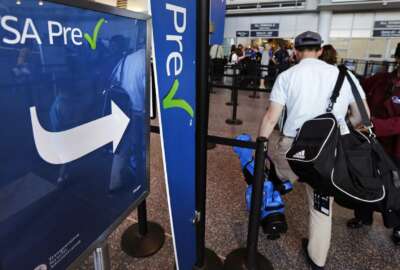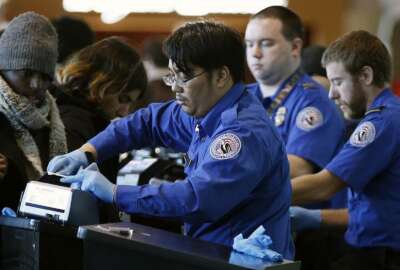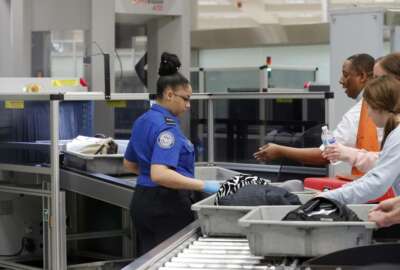20 years after 9/11, TSA officers renew calls for higher pay
DHS Secretary Mayorkas is reviewing proposals from the Transportation Security Administration, along with input from the American Federation of Government Emplo...
This story was updated on Friday, Sept. 10 at 8:15 a.m. with an additional statement from the Transportation Security Administration.
Nearly 20 years after 9/11, some transportation security officers see the upcoming anniversary as a key moment in their ongoing fight for higher pay and better working conditions.
Many officers saw Sept. 11, 2001 as a turning point, and it inspired them to join the newly-created Transportation Security Administration months later.
“We endure a lot as officers, not just from the agency but from the public as well,” LaShanda Palmer, executive vice president of the American Federation of Government Employees local that represents officers at the Philadelphia International Airport, told reporters last week.
Palmer has been at the agency for 19 years.
“For me, we have proven ourselves. We’ve proven ourselves not just to the agency but to the public,” she added. “We are here. We came here 19 years ago to do a job. We have shown them, every time we get furloughed, during the pandemic, that we are still coming to work. We are still going to do what we are required to do.”
Nearly 19 years after TSA’s creation, TSOs like Palmer are hopeful this year is another turning point.
Homeland Security Secretary Alejandro Mayorkas in June ordered TSA to expand collective bargaining rights, negotiate a new contract with its union and develop a plan to pay the agency’s airport screeners General Schedule wages.
Mayorkas is reviewing a draft determination from TSA on its plans to expand TSO collective bargaining rights, as well as AFGE’s input on that plan, Chris Blessing, the union’s staff counsel, said.
The secretary is also reviewing the agency’s proposal to provide TSOs with appeal rights at the Merit Systems Protection Board, he added.
“TSA has provided to the DHS secretary’s office a plan to improve the compensation framework for TSA employees,” an agency spokeswoman said in an email to Federal News Network. “The plan ensures that TSA employees are paid no less than their counterparts on the General Schedule scale and its longevity-based pay progression. TSA will continue its work on compensation through the budget process over the next several months.”
But there’s only so much DHS can do administratively to raise TSO pay and expand workplace rights. AFGE has been pushing Congress to pass the Rights for the TSA Workforce Act, which would permanently move TSOs into the Title 5 personnel system, expand collective bargaining rights and give officers MSPB appeal rights.
Brian Schatz (D-Hawaii) and Ed Markey (D-Mass.) have introduced a companion bill in the Senate. The legislation has yet to pass the full House and Senate.
The bill, which House Democrats have introduced twice before, would also give TSOs the chance to earn a salary under the 72-year-old General Schedule.
When Congress first created TSA nearly 20 years ago, it specifically excluded TSOs from the General Schedule pay scale and Title 5 personnel system, which many — but not all — other federal employees are classified under today.
Pascual Contreras, a steward at the AFGE local representing TSOs at the Phoenix Sky Harbor Airport, said he believes General Schedule pay would not only improve his standard of living but also would help TSA retain more talent.
“The TSA unfortunately hemorrhages a lot of talent,” Contreras said. “A lot of people show up to work, decide that it’s too much for the amount of pay and rights that we have and decide to go to other government organizations.”
Contreras and other TSOs said they see consistent turnover among their colleagues, and they see low pay as the main driver of the agency’s staffing challenges.
“When a new employee comes in the door, after they’re there for a year, they make approximately $3,000 less than me, and I’ve been here 19 years,” said Johnny Jones, the secretary-treasurer for the AFGE local representing TSOs at the Dallas/Fort Worth International Airport. “That is part of the problem with the TSA pay system, and it contributes to low morale and the continual rotation of employees out the door.”
There’s some bipartisan agreement in Congress that TSOs are underpaid, but members haven’t found consensus yet on the best path forward for raising their salaries. A blue-ribbon commission in 2019 recommended Congress appropriate more funding for TSA to raise officer salaries but advised members against moving TSOs to the General Schedule.
Turnover has long been a challenge for TSA, and it didn’t go away during the pandemic, TSOs said.
“Everyone who left during COVID either had concerns about COVID affecting their health and their pre-existing conditions [or] concerns that the agency wasn’t doing enough to protect them,” said Sarah Turley, a secretary for the AFGE local representing TSOs in West Virginia. “At that time, we weren’t issuing masks yet. The partitions weren’t in place; passengers weren’t wearing masks. So many officers extinguished a lot of their sick leave to take time off to stay off of work, and then when it was time to return to work they choose to leave the agency for their health.”
Part time TSOs have also left during the pandemic for more consistent hours and better pay, she added.
Contreras said he has former colleagues who have left for call-center jobs where they can work from home during the pandemic.
The job itself is difficult, and the pandemic has made it more challenging, the TSOs said.
Palmer recently returned to work after contracting COVID-19 herself.
“I was actually scared to come back, because what I went through with COVID, it was like I was on my death bed,” she said.
Today, TSA has 603 employees with active COVID-19 cases, according to the agency’s data. A total of 10,003 TSA employees have tested positive for the virus since the pandemic began, and 23 workers have died due to complications from COVID-19.
Officers are responsible for enforcing the federal mask mandate among passengers while they’re at the TSA screening hubs, and the agency recently told the union it’s seeing an uptick in passenger assaults and harassments against TSOs, Jones said.
“There’s definitely been a change in the passengers’ attitudes. Most of the passengers we’ve been seeing are less-frequent travelers, more vacationers. The masks seem to disrupt their vacation,” Turley said. “That doesn’t stop people from getting angry or just to vent because you’re there. They just want to vent to tell you how stupid they feel like the masks are. They’re just more highly agitated wearing the masks.”
Copyright © 2024 Federal News Network. All rights reserved. This website is not intended for users located within the European Economic Area.
Nicole Ogrysko is a reporter for Federal News Network focusing on the federal workforce and federal pay and benefits.
Follow @nogryskoWFED






